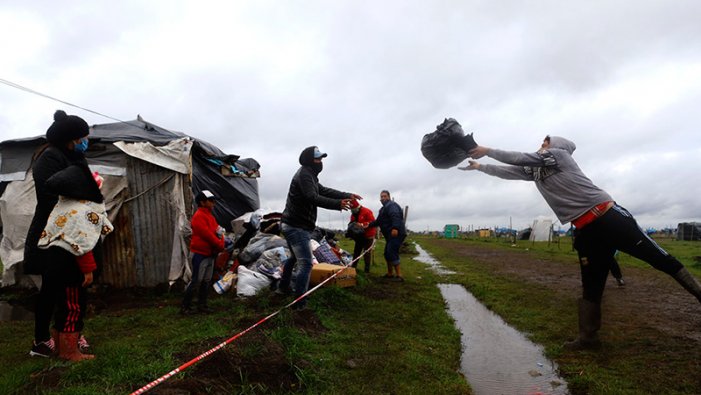Over 2,500 families are occupying land in Guernica, a town in the province of Buenos Aires, as part of a land seizure that began July 20. Many of these families have been left on the streets, impoverished and unemployed, in a country that is experiencing its third straight year of recession. The coronavirus pandemic has exacerbated these conditions, increasing the number of people who can no longer afford to pay rent. According to the latest statistics published by the government, 47 percent of Argentina’s population is in poverty.
Many women in the Guernica encampment are single mothers, many of whom traveled there to escape domestic violence. At only $70 a month, the meager welfare programs (including the Emergency Family Income, established for single-income households during the lockdown) are wholly inadequate to support a family.
The occupied land has been empty and without use for at least 50 years.
While gated communities continue to be built for the wealthy, families with fewer resources increasingly face overcrowding, poor-quality housing, precariousness, and lack of services such as water, sewage, electricity, and gas.
The 2,500 families occupying these 250 acres south of Buenos Aires are facing a Faustian bargain: the government offers only a vague promise of a plot of land elsewhere and some elusive aid to build in the future, in exchange for vacating the area. To those who don’t accept, there is the unequivocal threat of repression in the form of violent eviction by the police of Buenos Aires. But the families are ready to fight and put their bodies on the line to defend their right to housing.
Organized and accompanied by different human rights organizations, local organizations, and left-wing groups, the families have already mobilized both in the province and in the city of Buenos Aires, rejecting the threats of eviction and demanding the basic right to housing. The struggle that they have been carrying out, together with the enormous mobilization of human rights and student organizations, along with combative trade unions, forced the provincial Buenos Aires government to postpone two eviction orders.
Various groups of teachers, health care workers, and factory workers among others are carrying out a big campaign with different initiatives and activities to promote the broadest solidarity, with donations and mobilizing in the area, in a fight of the whole working class, which is bearing the brunt of the consequences of the economic crisis. PTS representatives Nicolás del Caño and Claudio Dellecarbonara have been among the most vocal defendants of the occupation, denouncing the government’s threats and rallying solidarity with the squatting families.
Who’s Who
The governor of Buenos Aires Province, Axel Kicillof, of the Peronist Frente de Todos coalition, and Sergio Berni, the security minister of Buenos Aires Province, have in recent weeks demonized the homeless and threatened repression if they do not leave the premises.
Berni has a long history of repressing workers. In the 1980s, he was part of a group of active-duty military men called Los Carapintadas. Through armed uprisings, they demanded impunity for those responsible for the genocide during the Argentinian dictatorship. Berni was also the minister of security in the cabinet of Cristina Fernández de Kirchner, during which he repressed workers’ struggles against layoffs. Always in favor of empowering the forces of repression, he covered up for the police in the disappearance and murder of Facundo Astudillo Castro, a young worker who went missing in April.
The so-called progressives are using lies and extortionist maneuvers to defeat the occupation. The government of President Alberto Fernández is showing that its real interests are far from the needs of the working class. It has already cut taxes for export-oriented agricultural producers and the polluting mining companies. The government presented a 2021 budget for health and social assistance adjustments in response to the demands of the International Monetary Fund (IMF), which visited Argentina this week to carry out an initial inspection. This stands in stark contrast to the Kirchnerist campaign of “Out with the IMF,” which we saw during the government of former president Mauricio Macri.
The government will continue to try to evict the families in Guernica. Its priority is to guarantee profits for the real estate business. Behind the pressure to evict these thousands of people are the large real estate companies, in particular the business group El Bellaco SA. El Bellaco is only one among several real estate developers seeking to make huge profits by building gated communities and luxury buildings in the occupied area.
The unions, most of them co-opted by the government, have failed to meaningfully resist the government or express any kind of solidarity with the families in this critical fight.
The Struggle for Housing Continues
The government of Buenos Aires Province is trying to persuade families to leave the occupied land before the October 15 eviction date by promising future lots for each family. The officials arrived at the site offering “solutions”; the day before, however, a Buenos Aires Police helicopter flew over the site, motorcycles and ATVs of civilian officers entered the site, and criminal cases continued to be opened against the families. The only concrete proposal put forward would mean that these families would have to withdraw immediately and live “wherever they can” or face violent repression.
Large mobilizations took place on October 8 across Buenos Aires Province. Thousands mobilized in the city of La Plata, near the seat of the provincial government, and in the city of Buenos Aires, protesters marched from the Congress to Plaza de Mayo.
Workers fighting against layoffs, precariousness, and repression joined the struggle for the families in Guernica and for justice for Facundo Castro on October 8 in a mobilization called by the Encuentro Memoria Verdad y Justicia, a human rights organization. Also participating in the demonstration were the main leaders of the Frente de Izquierda y los Trabajadores–Unidad (Left and Workers’ Front–Unity, FIT-U), such as Nicolás del Caño, Myriam Bregman, Gabriel Solano, Christian Castillo, Claudio Dellecarbonara, and Celeste Fierro.
The mainstream media have only reproduced the government’s narrative and demonized the land occupiers. Both are trying to hide the ghastly conditions that thousands of families, men, women, and children are facing in the midst of a global pandemic and a severe economic crisis. It is the role of the organized Left and militant left unionists to surround the conflict in Guernica with the most powerful working-class solidarity in order to stop evictions and to secure the right to housing and a piece of land to all families in the occupation. It will set an important precedent for all the homeless in Argentina.
Translation: Otto Fors











